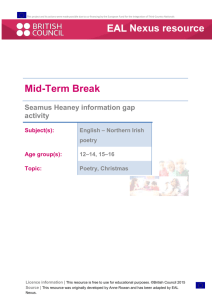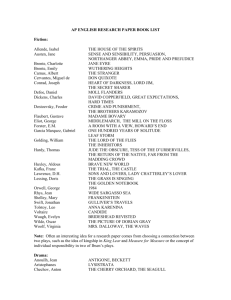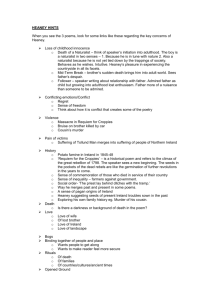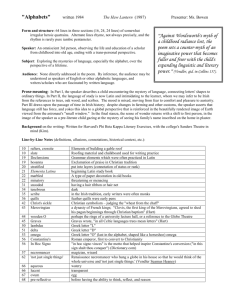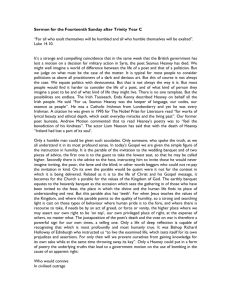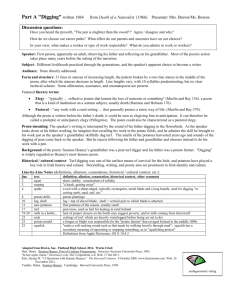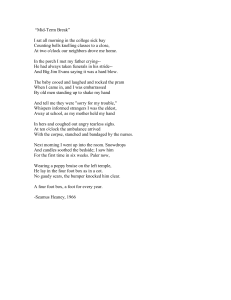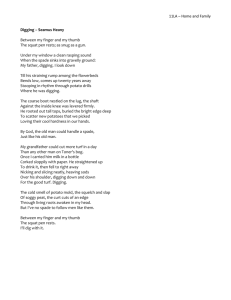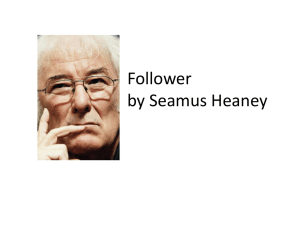Seamus Heaney
advertisement
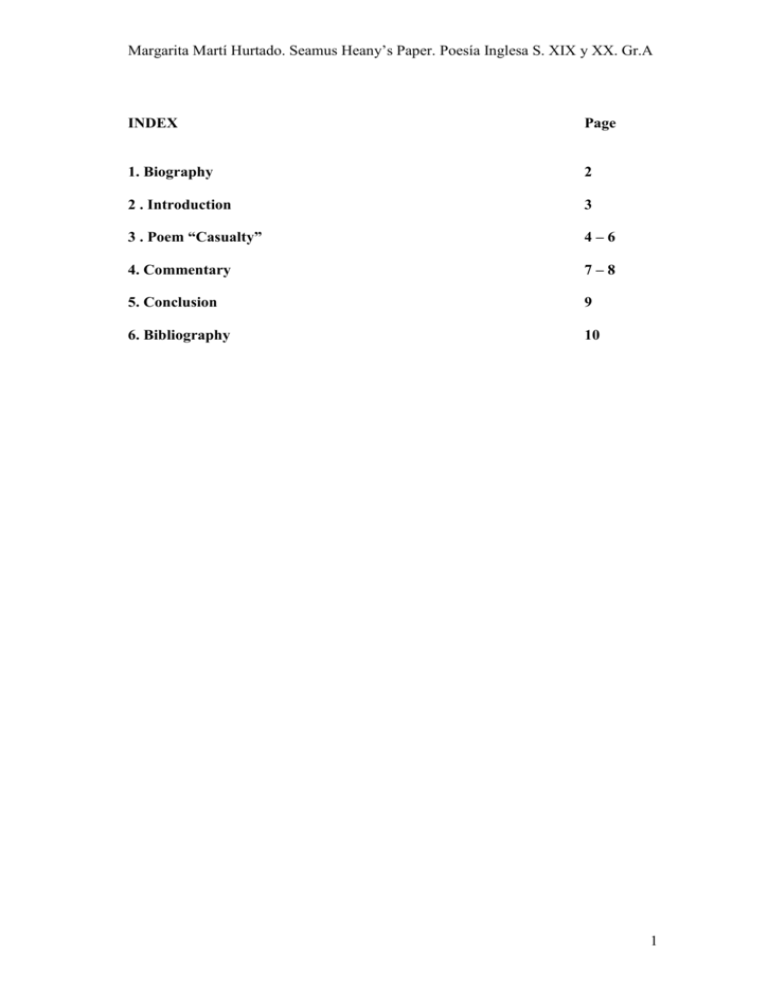
Margarita Martí Hurtado. Seamus Heany’s Paper. Poesía Inglesa S. XIX y XX. Gr.A INDEX Page 1. Biography 2 2 . Introduction 3 3 . Poem “Casualty” 4–6 4. Commentary 7–8 5. Conclusion 9 6. Bibliography 10 1 Margarita Martí Hurtado. Seamus Heany’s Paper. Poesía Inglesa S. XIX y XX. Gr.A THE NOBEL PRICE IN LITERATURE 1995 BIOGRAPHY Born to a catholic family in Northern Ireland, Heaney received his B.A. from Queen's University, Belfast, in 1961. He has taught widely in secondary schools and universities since then. With his first book, Death of a Naturalist , Heaney began his work of revealing life in rural Ireland as he esperienced it in his boyhood.He is also concerned with the poet's political role; the poet is both helpless witness and accomplice in the fratricidal battles of his country. A Catholic caught in the sectarian violence of his native Belfast, he understands the trap of history. Heaney's poems first came to public attention in the mid-1960s when he was active as one of a group of poets who were subsequently recognized as constituting something of a "Northern School" within Irish writing. Although Heaney is stylistically and temperamentally different from such writers as Michael Longley and Derek Mahon (his contemporaries), and Paul Muldoon, Medbh McGuckian and Ciaran Carson (members of a younger Northern Irish generation), he does share with all of them the fate of having be en born into a society deeply divided along religious and political lines, one which was doomed moreover to suffer a quarter-century of violence, polarization and inner distrust. This had the effect not only of darkening the mood of Heaney's work in the 1970s, but also of giving him a deep preoccupation with the question of poetry's responsibilities and prerogatives in the world, since poetry is poised between a need for creative freedom within itself and a pressure to express the sense of social obligation felt by the poet as citizen. The essays in Heaney's three main prose collections, but especially those in The Government of the Tongue (1988) and The Redress of Poetry (1995), bear witness to the seriousness which this question assumed for him as he was coming into his own as a writer.1 A Catholic born in Northern Ireland in 1939 but who moved to Dublin in 1972, Heaney felt the violence in his homeland passionately and wrote of it often, but usually close up, with elegies to slain friends and descriptions of other events and people rather than with broad pronouncements and prescriptions. 2 1 http://nobelprize.org/nobel_prizes/literature/laureates/1995/heaney-bio.html 2 http://www.boston.com/globe/search/stories/nobel/1995/1995m.html 2 Margarita Martí Hurtado. Seamus Heany’s Paper. Poesía Inglesa S. XIX y XX. Gr.A INTRODUCTION Due to the fact that my individual papers deal in a way or another with Religion, I would like to comment a poem by Heany, the one called "Casualty" , a poem about a Catholic friend murdered by a bomb set by the Provisional Irish Republican Army in a Protestant pub, where the author gives us another look at the tribal warfare in Northern Ireland. His questioning of his friend's responsibility for his own death realizes the ambiguous nature, the muddling of right and wrong, that grips Northern Ireland today. And yet, what is important is not placing blame, but the recognition of what remains to those who live, memories and sadness. We can cleary see how Heaney is equally moved and repelled by the spectacle of a people united by tragic and possibly futile martyrdom. All the poet can do is hold to his bewilderment and the pain of his loss as he describes his friend the mornig of his death in his "proper haunt". "Casualty" With its carefully controlled rhyme scheme, is a superb elegy, giving human dignity by the power of its art to the memory of a man so brutally and uselessly murdered.3 3 http://www.northernshow.biz/seamus_heaney.htm 3 Margarita Martí Hurtado. Seamus Heany’s Paper. Poesía Inglesa S. XIX y XX. Gr.A CASUALTY I He would drink by himself And raise a weathered thumb Towards the high shelf, Calling another rum And blackcurrant, without Having to raise his voice, Or order a quick stout By a lifting of the eyes And a discreet dumb-show Of pulling off the top; At closing time would go In waders and peaked cap Into the showery dark, A dole-kept breadwinner But a natural for work. I loved his whole manner, Sure-footed but too sly, His deadpan sidling tact, His fisherman's quick eye And turned observant back. Incomprehensible To him, my other life. Sometimes on the high stool, Too busy with his knife At a tobacco plug And not meeting my eye, In the pause after a slug He mentioned poetry. We would be on our own And, always politic And shy of condescension, I would manage by some trick To switch the talk to eels Or lore of the horse and cart Or the Provisionals. 4 Margarita Martí Hurtado. Seamus Heany’s Paper. Poesía Inglesa S. XIX y XX. Gr.A But my tentative art His turned back watches too: He was blown to bits Out drinking in a curfew Others obeyed, three nights After they shot dead The thirteen men in Derry. PARAS THIRTEEN, the walls said, BOGSIDE NIL. That Wednesday Everyone held His breath and trembled. II It was a day of cold Raw silence, wind-blown Surplice and soutane: Rained-on, flower-laden Coffin after coffin Seemed to float from the door Of the packed cathedral Like blossoms on slow water. The common funeral Unrolled its swaddling band, Lapping, tightening Till we were braced and bound Like brothers in a ring. But he would not be held At home by his own crowd Whatever threats were phoned, Whatever black flags waved. I see him as he turned In that bombed offending place, Remorse fused with terror In his still knowable face, His cornered outfaced stare Blinding in the flash. 5 Margarita Martí Hurtado. Seamus Heany’s Paper. Poesía Inglesa S. XIX y XX. Gr.A He had gone miles away For he drank like a fish Nightly, naturally Swimming towards the lure Of warm lit-up places, The blurred mesh and murmur Drifting among glasses In the gregarious smoke. How culpable was he That last night when he broke Our tribe's complicity? 'Now, you're supposed to be An educated man,' I hear him say. 'Puzzle me The right answer to that one.' III I missed his funeral, Those quiet walkers And sideways talkers Shoaling out of his lane To the respectable Purring of the hearse... They move in equal pace With the habitual Slow consolation Of a dawdling engine, The line lifted, hand Over fist, cold sunshine On the water, the land Banked under fog: that morning I was taken in his boat, The screw purling, turning Indolent fathoms white, I tasted freedom with him. To get out early, haul Steadily off the bottom, Dispraise the catch, and smile As you find a rhythm Working you, slow mile by mile, Into your proper haunt Somewhere, well out, beyond... Dawn-sniffing revenant, Plodder through midnight rain, 6 Margarita Martí Hurtado. Seamus Heany’s Paper. Poesía Inglesa S. XIX y XX. Gr.A Question me again. 4 COMMENTARY The poem is divided in three sections: I, II; III. The number one is, at the same time, divided in three paragraphs.It is in the first of them, from "He would drink..." to "observant back.", Where Heaney is giving the description of his friend , both, his gestus: " a lifting of the eyes" or "a discreet dumbshow" when ordering a drink in the pub, and also the kind of person he was: "a dolekept bread winner","Sure-footed but too sly". His friend was a fisherman, with a quick eye, who normally likes going to the pub and drink some beers with the friends, or even alone "He would drink by himself", after a hard day fishing. This is another poet in love with his language -- specifically, the cadences of the Irish tongue. The sounds of clattering, bumping, and sliding words -- held together by the echo of repeated vowels -- propel the poems along. Most often his works involve a story, or at least a speaker angling from his own particular place and time.5 The second paragraph goes from "Incomprehensible" to "or the provisionals". What we have to notice is the word "Incomprehensible", Heaney leaves this word at the head with a purpose, we could take the word in the sense that it was "incomprehensible" to his friend the other life of Heaney, the literal meaning, or to realise the readers of the poem how "incomprehensible" is the fact of killing an inocent man. That is the real message the author wants to transmit to us . Heaney, in this second paragraph, goes on with the description of a day at the pub with his friend, just having some beers and after a "slug" talking a little bit about poetry, and at that moment "they would be on their own" but always politic emerged, Heaney tried " to switch the talk to eels..."The word eels has been chosen properly because it gives us the sense of danger, an eel is a snake-fish and as a snake could be dangerous but also it is capable of slide between the one issue or another, "lore the horse..." , "or the Provisionals". The author is describing those moments in which he and his friend were talking about the difficult situation in Nortern Ireland. Heaney’s poems have exhibited a remarkable power to move and impress readers with both private emotion and public anguish.6 4 http://www.ibiblio.org/ipa/heaney/casualty.txt 5 http://www.artandculture.com/cgi-bin/WebObjects/ACLive.woa/wa/artist?id=1402 6 Helen Vendler “ The Breaking of Style” Harvard University Press. 7 Margarita Martí Hurtado. Seamus Heany’s Paper. Poesía Inglesa S. XIX y XX. Gr.A "But" it is how starts the third paragraph wich continues until "...and trembled". Heaney describes how his friend was killed, "blown to bits". The fisherman was drinking in a "curfew", His death is set against the terrible incident of "Bloody Sunday" , January 30, 1972 three nights after the British paratroopers killed thirteen Catholics in derry. People were really frightened and stayed at home,"But" he disobeyed, that is the reason why he was killed that night. Heaney shows in this paragraph the image, after the brutally crime, of what kind of people were those who comitted such a thing. They were not happy enough with that, they even wrote in the walls those words to make fun of a cruel act. In the walls they expressed: "PARAS THIRTEEN, BOGSIDE NIL", They wrote the number of dead people as if it were a football score; British paramilitary 13, the Bogside, a poor Catholic district of Derry,0. The second section of the poem is also divided in three parts.The first which goes from "It was a day..." to "Like brothers in a ring" where the author is giving the description of the funeral of the people assassinated in the massacre. It was a"common funeral " as they were Catholics from a poor district. There was a lot of people in the cathedral because they were "packed" and ended "braced and bound " like brothers, united by a trist situation. The second paragraph goes from "But" to "Blinding in the flash". The word at the begginning "But" is saying that despite the facts occurred, despite the treats, his friend would not be held at home. He decided to turn in that offending place, to that pub where he found dead in such way. Heaney describes the imagined face of his friend before the blast with the feeling of terror and remorse marked in his face. The last paragraph of this section goes from "He had gone miles away" To "The right answer to.." The poet is comparing his friend to a fish who goes towards the lure, which were the pubs he used to go during the nights, to have some drinks. I would like to notice the vocabulary the author has employed in this comparison, words as for instance: "swimming”,” lure", "drifting" used consciously due to the fact that his friend was a fisherman. It is at the end of this paragraph where Heaney is asking himself about the reason why his friend was killed, about his culpability, and he remember one of his conversations he had with his friend, talking about their tribe's affairs and what is the right answer to their problems. The third section goes from "I missed his funeral" to "Question me again". Heaney is describing his funeral, at which he didn't assisted, giving details of the ceremony that was being habitual in Northern Ireland. He mentions the quiet walkers, the purring of the hearse, the slow consolation,etc, all that are images of the slowly procession towards the cementry.In contrast, the image of that morning, fishing in his boat where "Tasted Freedom" with him. The poem finishes defiant, calling his friend from death, "question me again" just to tell him his point of view after what has happened recently. The author feels the pain of his loss but asks his friend again. 8 Margarita Martí Hurtado. Seamus Heany’s Paper. Poesía Inglesa S. XIX y XX. Gr.A CONCLUSION In this poem, Heaney with the description of what happened to a friend,a fisherman, points out to the sectarian conflict in Northern Ireland, where Religion and Politics altogether were the basic problem in a society that nowadays seem that they have found a solution for their understanding and coexistence. The poet felt the violence in his land, and wrote about it , probably to send a political message, to show society that acting in such a violent way was not worthy, and it didn’t solve the problem in his country, he was trying to send a message for peace, terrorism had been present in his country for too many years, and it was time to stop this and start looking for some solutions for a better future. 9 Margarita Martí Hurtado. Seamus Heany’s Paper. Poesía Inglesa S. XIX y XX. Gr.A BIBLIOGRAPHY Helen Vendler “The breaking of Style”. Cambridge,Massachusetts. London.England 1995. Harvard University Press. http://nobelprize.org/nobel_prizes/literature/laureates/1995/heaney-bio.html 11th May 07 http://www.boston.com/globe/search/stories/nobel/1995/1995m.html 11th May 07 http://www.northernshow.biz/seamus_heaney.htm 15th May 07 http://www.ibiblio.org/ipa/heaney/casualty.txt 15th May 07 http://www.artandculture.com/cgi-bin/WebObjects/ACLive.woa/wa/artist?id=1402 16 May 07 >Back< 10 Margarita Martí Hurtado. Seamus Heany’s Paper. Poesía Inglesa S. XIX y XX. Gr.A 11 Margarita Martí Hurtado. Seamus Heany’s Paper. Poesía Inglesa S. XIX y XX. Gr.A 12
